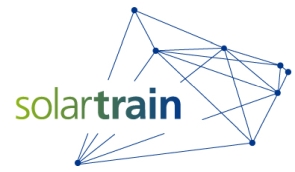About
| Project title | Photovoltaic modules life time forecast and evaluation |
| Acronym | SOLAR-TRAIN |
| Start date | 01/09/2016 |
| Duration in months | 48 |
| Call identifier | MSCA-ITN-2016 Innovative Training Networks |
| Coordinator | Dr. Karl-Anders Weiß, Fraunhofer Institute for Solar Energy Systems ISE |
| GA number | 721452 |
The scientific work and training will be carried out in the framwork of five work packages (WP):
1. Climatic degradation factors
A service life-time prediction has the potential to become a very elaborate multi-vector test cycle. This WP aims to understand what failure modes occur in different environments. A practical outcome will be a screening approach for failure modes that can be carried out in highly accelerated conditions in the laboratory. The WP further aims at the development of data sets that allow the classification of geographical regions according to their climatic loads. Therefore it focusses on the calculation of synergistic effects of different climatic factors (T, r.h., UV, TC...) with regard to degradation effects in materials and full modules.
The work is embedded in WP 3 and is led by the University of Ljubljana, Slovenia.
2. Analysing degradation and failure modes of PV modules
The aim of this WP is to achieve a comprehensive understanding of the degradation mechanisms in the field and the possibility of tracing them back to the manufacturing steps. That process could be done through the identification of failure modes as well as the investigation of critical parameters in the manufacturing line that could provide an early signal of potential degradation expected. Early degradation or failures, as well as standard aging mechanisms, will be analysed. Ideally the goal will be to define figures of merit applicable to the manufacturing process to stop/modify/rework product fabrication.
The work will be supervised by specialists from CENER, Spain, as part of WP 4.
3. Evaluation of polymeric materials in PV modules
This WP deals with the investigation and evaluation of polymeric materials which are utilized in and promising new materials (e.g. PE based encapsulants; fluorine free backsheets based on PET, PA or polyolefines) for PV modules. Prominent PV module degradation and failure modes like yellowing, delamination, potential induced degradation or corrosion are directly linked to the degradation behaviour of the polymers. The focus of the research will be placed on the weathering stability of the materials as well as on the interactions of the different materials within a PV module for different stress factors and micro-climates.
The work is part of WP 5, coordinated by PCCL, Austria.
4. Service life time prediction of PV modules and systems and related economic impact
The aim of this WP is to develop degradation models that allow a prediction of the service lifetime of PV modules and systems, including the specific internal and external aspects, such as e.g. material properties, materials interactions, and climatic influences. The main focus is on the identification of the relevant rate dominating processes like hot spots, cracks, PID, UV embrittlement, delamintation, influencing (climatic) factors and the related kinetics for the degradation for PV modules. This way, a path-breaking tool for the climate- and module-dependent calculation of the yield of a PV plant throughout its lifetime shall be provided.
Service life time prediction is topic of WP 6, led by Fraunhofer ISE, Germany.
5. Innovative Training
The scientific work in SOLAR-TRAIN is accompanied by an innovative training scheme that goes beyond mere knowledge. To enable a good integration of the project in individual PhD theses and the personel career development of ESRs, this WP envisages a range of learning modules and training measures as part of the overal programme. Next to basic training modules at indiviual host institutions, Summer Schools will be organized on a regular basis. They are supplemented by online seminars, soft skill courses and international secondments at renowned partner institutions around Europe.
The training programme is integrated in WP 2, coordinated by Loughborough University.
